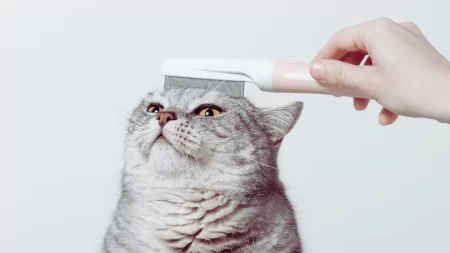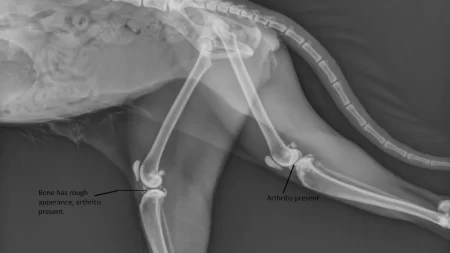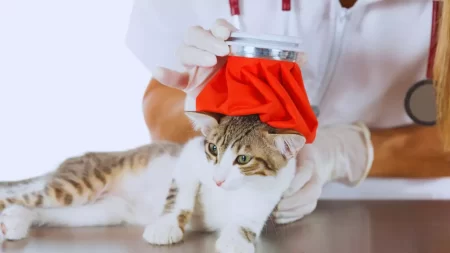Cats can get roundworms from various sources, such as their mother’s milk, eating infected prey, or ingesting contaminated soil, or feces.
You’re a pet parent, and you care about safeguarding your cat from parasites, like roundworms. But, where do they originate from? This article will provide insight into the complex lives of cats. Plus, ways to prevent roundworm infestations. Uncover the answers to this enigma now!
Roundworms present health risks to cats, and can even be a danger to humans on rare occasions. Knowing how they spread helps you recognize, prevent, and treat infections.
What are Roundworms?
Roundworms, or nematodes, are one of the most frequent intestinal parasites in cats. Infection happens from contact with contaminated soil or feces. Two main types exist Toxocara species and Ancylostoma species.
Toxocara cati is most common and travels from egg to adulthood in feline intestines. It’s usually found in soil but can be passed from mother to kitten in the womb or by eating contaminated food, water, or prey.
Ancylostoma species are less typical, but still, cause anemia and malnutrition if not treated. These worms feed on blood, including from their host cats, unlike other roundworm species. They enter through contact with contaminated soil or clothing with eggs.
Signs of roundworm infection in cats include:
- Vomiting
- Diarrhea
- Weight loss
In serious cases, worms may be seen in vomit or stool collected by the vet. Treatment includes de-worming medicine and regular fecal analysis to ensure all eggs are gone.
Where do Roundworms Come From?
They live in the kitty’s digestive tract and can cause trouble. The main way cats catch them is through their mother’s milk. But, contact with infected animals or soil can also spread them. Cats exploring and hunting outdoors, or other cats, can carry them. Infected cats may have worms in their poo, but many show no signs. A vet can help detect and diagnose any roundworm infections.
Kittens get roundworms from their mother’s milk after birth. Adult cats can also get them. Eating spiders, earthworms, rodents with roundworms in their intestines, or grass contaminated with eggs from an infected wildlife species, can spread them. Carnivorous cats who hunt outdoors can easily get infected.
Cats of all ages should get deworming treatments, even if they don’t show any illness. Young kittens are more easily affected, due to their immature immune system. But, adult cats can also host these parasites.
How Do Cats Get Roundworms?
Cats can get roundworms, also called nematode parasites, in many ways. Eating infected prey like small rodents, snails, or earthworms is one way. They can also get them by touching the feces of an infected animal or person. In rare cases, cats get them by licking eggs off their fur after touching an infected surface.
Roundworm eggs need to be outside the host to infect a cat. This usually happens when they come in contact with soil that has been contaminated by roundworm eggs from another cat. The eggs can survive up to four weeks in good conditions.
Cats can become infested by:
- eating immature or adult worms from another infected animal’s feces
- nursing infested kittens
- eating raw meat
- being fed by wild animals who leave stool-containing worm eggs
- rarely, a cat can have roundworms when born due to transmission in the uterus or during nursing
Roundworm larvae enter the body and move around different organs such as the liver, heart, and eyes. They then move back down and mature into the parasitic form along the digestive tract wall. Here, they lay thousands of infective eggs that are passed through the feces and contaminate the environment. Without proper and timely treatment, these worms can spread beyond the home.
Symptoms of Roundworm Infection in Cats
Roundworms are the most widespread intestinal parasite among cats. They appear like a strand of spaghetti, but they can go unnoticed. Even though they are not always life-threatening, they can cause health issues if they overpopulate or the cat is allergic to them.
Cats with roundworms have a “potbellied” look. Other tell-tale signs are:
- Lackluster fur
- Too much shedding
- Constipation
- Diarrhea
- Vomiting
You may even observe worms in their stool or vomit. If not treated, roundworms can weaken muscles needed for eating and moving. And, it can make cats more prone to other parasites and illnesses.
If your cat has any of these symptoms, go to the vet right away. This will help your pet stay healthy.
Diagnosis and Treatment of Roundworm Infection in Cats
Roundworm infection in cats, caused by the nematode parasite Toxocara cati, is quite common. Kittens and adult cats are both at risk.
Roundworms are passed on through the mother’s feces. Contaminated food or contact with an infected cat’s environment can also transmit them.
Diagnosis is made via physical exam and lab tests to spot parasite eggs in a fecal sample.
Treatment typically involves drugs to get rid of the worms from the intestines. Plus, supportive care with proper nutrition and hygiene.
If left untreated, roundworm infection in cats can lead to anemia, pneumonia, and digestive upset – serious health issues.
Prevention of Roundworm Infection in Cats
Cats can get roundworm infections, so it’s essential to take preventive steps. Vaccines and medicines help protect cats, but there are other things to do too. Here are a few tips:
- Keep the litter box clean. Use gloves and wash your hands afterward.
- Keep cats away from other cats who may have worms or parasites. Don’t let them mix households.
- Pick up after your cat when they go outside. This reduces their exposure to contaminated soil.
- Give monthly flea and worm treatments. Speak with your vet about a suitable product for your cat.
- Feed your cat a healthy diet with the right vitamins and minerals. This keeps their immune system strong.
Conclusion
If your kitty got fleas, they may have roundworms too. This can be bad for you and your pet. To stay safe, keep good hygiene when dealing with the litter box. Get your cat dewormed and checked by a vet. If you think they have roundworms, go to the vet quickly.
Taking precautions protects you and your pet from roundworms:
- Keep good hygiene when dealing with the litter box.
- Get your cat dewormed and checked by a vet.
- If you think they have roundworms, go to the vet quickly.




![Where Do Cats Get Roundworms? [Understanding The Sources] where do cats get roundworms](https://justcatlover.com/wp-content/uploads/2023/02/where-do-cats-get-roundworms-1024x576.jpg)


